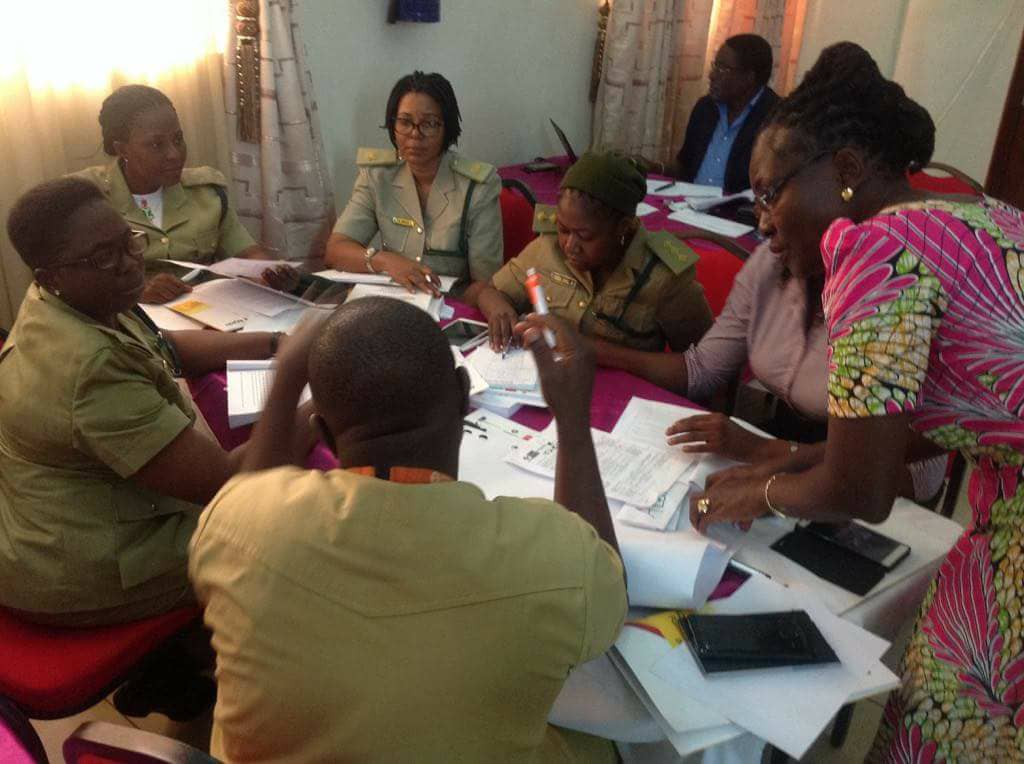
Stories of tears, love and bedbugs | Inside Women Inmates detention facilities in Nigeria.
The number of women in Nigerian Custodial Centres is on the rise. With the rise in the number of women inmates, there are a number of concerns that demand urgent attention. First, where women have children or are pregnant, the first victim is the child. It is difficult to say which is better, to separate children from their mothers or to keep them together in incarceration. Human Rights principles that refer to children especially the United Nations Convention on the Rights of the Child, emphasize the best interest of the child as the only acceptable standard. This remains a hurdle that the criminal justice system in Nigeria must cross and sooner rather than later. In addition, women in incarceration face other challenges such as abandonment by family, deprivation of food, water and decent shelters. The need to draw the lines between what a privilege and right should constitute in correctional institutions in Nigeria.
Key Issues
Nigerian society, like most of the world, constitutes a patriarchal setup which subjugates women. This manifests in desirability and access to support that everyone is exposed to, but is exceptionally skewed to benefit men. Hence, a man will swiftly receive assistance from family and his home community if he is incarcerated. However, the woman is often left to her fate. Some lose their husbands and children while most are unable to return to their home communities. This is not a problem of the Correctional Service but should have been an important factor in planning programs for women's custodial facilities. In our analysis of detention conditions of women across Nigeria, this issue was a constant for all the women who were mothers. For Bimbo (not real name) in Lagos, whose husband had left and must now cater for her child’s education in a boarding school. The prospects of fundraising are bleak for women in our society. This is not because altruism is lacking among the affluent, but because the women who dare to ask are subject to abuse. When a woman is incarcerated, her chances of fundraising are next to none. But this remains Bimbo’s experience; a constant struggle to give a better life to her child and afford for her, the luxury of education that she never had. For Bimbo and other women like her, the struggle goes beyond, sharing inhumane, degrading spaces with a baby or just the pain of missing a child or children, but the burden of providing a means of life for children who roam the society with little positive socialization. The question that comes to mind is, is the greater good achieved by incarcerating women in a society that is devoid of an efficient social welfare system? Nigeria has an abundance of food with all regions producing staple foods in large quantities. However, the one place there will certainly be a lack of edible food is in our custodial Centres. Most of the women inmates we spoke to had the same testimony concerning food. Foods served to inmates were not fit for animals to eat. Only one Centre appeared to have some good food and that was the Women’s Custodial Centre in Kirikiri, Lagos State. In the other locations where women were housed in Men’s facilities, the food and kitchen were run by the male convicts who had little or no culinary training. The result was not very good. An elderly woman ex-inmate told us in Katsina State that the food lacked Maggi (the commonest spice used for most local dishes). In order words, the foods served to female inmates were tasteless and the foods were consumed to avoid starvation. For most women inmates, the daily task of feeding is a depressing part of the day and has punitive value. It would be unfair to discuss feeding without making reference to children in custodial centres who are expected to live on the plate of food as their mothers. Baby formula is not provided; hence, the women must find ways to feed the children. Water is a luxury for many Nigerians and without the provision of pipe-borne water in most cities, people have to source alternative water sources. As with the food in custodial centres, so is water in the male section of the Centre. In some Centres, male inmates must supply water to female sections using buckets and this serves as their supply for a day or more. Governments at the State levels do not supply water to Correctional Centres which is the responsibility of the Federal Government. A partnership between the State and Federal Governments to supply water to Custodial Centres would adequately solve this problem but is only a thought at this point. Access to Water is a human right and should be provided for free to all persons in incarceration. The disproportionate appropriation of resources such as water and food to men's and women's facilities should be corrected as soon as possible. Every woman in a custodial centre who is within her reproductive year is certain that her next period will arrive. What she may not know is if she will have sanitary pads, and toilet rolls or just allow the blood to flow down her legs. Menstrual cramps are a non-issue for women who reside in facilities that expose them to infections and ill health. There is no system that provides these essential materials to these women. Goodwill from charity organizations and other persons is the only hope for these women. It would seem that the government has not taken the time to think of the needs of the women they have incarcerated. Detention condition in Women's Custodial institutions is better imagined. Unlucky women in these institutions have beds to sleep on. They are unlucky because the beds are sometimes as old as the facility and have a heritage of bedbug infestation. When they have children, the children too must endure the nights of torture. Unsanitary environments are characteristic of the custodial centres but that is a story for another day. Healthcare is a big issue in every society. It is unfortunate that the common people in Nigeria do not have access to adequate healthcare. For inmates, it is worse. There are no health centres and where they exist, there is an inadequate supply of medication and healthcare providers. Drugs were supplied sporadically for a short period between 2018 and 2019. This stopped as suddenly as it began and ended the hopes of a revitalised healthcare system in the Correctional Service. Women’s health needs are not recognised and are provided when they can no longer be ignored. An example of such a scenario is the case of pregnant women in Custodial Centres. These women who must have their children at the ninth month must then be provided only what is necessary for safe delivery. The fate of the children born while their mothers are incarcerated is not very clear. One sure thing is that no one wants to be, and should be made to be; in that position.
Altruism versus Rights
A common observation in all facilities that we visited, was the cordiality between the inmates and the correctional officers. The inmates were better off because the officers were kind and generous. Inmates testified about how they received sanitary pads, baby formula and bathing soap among others. This is commendable but at the same time worrisome. It is worrisome because the Officers have to bear the responsibilities of the government and would not dare to be seen as demanding more welfare for inmates. It is even more worrisome that the wardens should deserve better welfare packages too but again, speaking up is not characteristic of the profession. So, things remain as they are, generous wardens and needy inmates in a story that should rather be about inmates’ human rights that are met by the government. Basic necessities of life such as water, food, healthcare, and shelter should not be an afterthought or driven by altruistic intentions. Rather they should be driven by a government that is conscious of people’s rights and their responsibilities to meet them. An ethical debate could ensue thus, ‘should wardens stand by and do nothing while inmates literally decay in custodial centres? The answer is best left to each person’s conscience. The government has to see the monstrosity that this institution for warehousing people has become and rise to its true responsibilities.
Conclusion
The Nigeria Correctional Service has come a long way and has developed a reasonable policy document for its operations (The Correctional Service Act, 2019). Women in incarceration have two operational facilities out of over two hundred and forty centres in the country. Now would be a good time to designate at least one standard facility in each State for women inmates. Now would also be a good time to mobilise all the actors in the criminal justice system to be more thoughtful in handling cases involving women. My purpose is not to advocate for non-custodial measures, but to call for inter-sectoral collaboration in managing cases where children will be affected as well as in providing gender-specific needs of women across detention centres in Nigeria.

Comments
No Comment available!